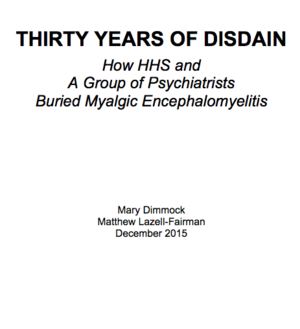Thirty Years of Disdain
 | |
| Author | Mary Dimmock, Matthew Lazell-Fairman |
|---|---|
| Country | United States |
| Language | English |
| Subject | Medical history |
| Genre | Medical |
| Publisher | Self-published |
Publication date | 2015 |
| Media type | digital |
| Pages | 327 |
| Website | Download a copy |
Thirty Years of Disdain — How HHS and A Group of Psychiatrists Buried Myalgic Encephalomyelitis is a paper written by Mary Dimmock and her son, Matthew Lazell-Fairman, a ME/CFS patient, covering the history and the politics of ME, with a particular focus on how the US Health and Human Services (HHS) and a group of British psychiatrists have handled the disease.
Synopsis[edit | edit source]
Patient advocate Mary Dimmock and her son, Matthew Lazell-Fairman, a severe Myalgic Encephalomyelitis patient, have authored a document, “Thirty Years of Disdain: How HHS and a Group of Psychiatrists Buried Myalgic Encephalomyelitis.”
The thoroughly researched and thoughtfully crafted document provides an account of Matthew’s own battle with the disease, as well as a historical account of the litany of factors that have impacted research, prevented the development of effective treatments, degraded clinical care, and promoted the disbelief and disdain that ME/CFS patients endure.
In the document, Dimmock states: “for the last thirty years, political agendas, institutional neglect, and bad science have buried ME under a vague condition of ‘fatigue,’ often associated with mental illness. The most widely accepted treatments have been cognitive behavioral therapy and graded exercise, used to convince patients they are not really sick, just deconditioned. Medical care is abysmal and too often results in physical harm. ME patients have been so neglected, disbelieved, and stigmatized that some have lost hope and committed suicide.”
Dimmock said that their intent in writing the document was to shine a light on the magnitude of systemic change required of both Health and Human Services and the medical community at large to correct the situation and give ME patients hope in the future. “Ill-defined patient cohorts, band-aids and incremental changes are not enough to jump-start this long-neglected field,” said Dimmock.[1]
Links[edit | edit source]
Updated Dec., 2015.
See also[edit | edit source]
References[edit | edit source]

